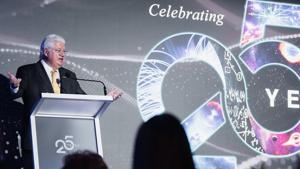Science
Perimeter Institute Marks 25 Years of Advancements in Physics

The Perimeter Institute for Theoretical Physics in Waterloo is celebrating its 25th anniversary, a milestone that coincides with the United Nations’ International Year of Quantum Science and Technology. The institute has made significant contributions to theoretical physics, cosmology, and quantum computing since its founding in 2000 by Mike Lazaridis, who donated over $100 million to establish the organization.
The inspiration for the institute can be traced back to Lazaridis’s time as an electrical engineering student at the University of Waterloo. An informal lecture by his professor, Lynn Watt, introduced him to groundbreaking research by Alain Aspect on entangled particles, a fundamental concept in quantum mechanics. “The entire class was stunned,” Lazaridis recalled during a speech at the institute’s anniversary event on September 25. “Some of us fell out of our seats, quite literally.”
Lazaridis emphasized that the unification of Einstein’s theory of relativity and quantum mechanics is crucial for future technological advancements. He stated, “Every time different forces were unified using mathematical theories, it created enormous opportunity for industry and unimaginable wealth.”
The Perimeter Institute has become a hub for research and education in theoretical physics, attracting scientists and scholars from around the globe. Its researchers have developed innovative educational programs that reach high school students in 142 countries and contributed to the creation of radio telescopes designed to detect rapid bursts of radio waves from deep space.
A proud moment for Lazaridis was witnessing the first-ever photographs of a black hole, captured by the Event Horizon Telescope Collaboration in 2019. This achievement, which graced the front pages of newspapers worldwide, was made possible through technology developed at the Perimeter Institute. “We contributed to that in a big way,” Lazaridis said, reflecting on the significance of the event.
The anniversary celebration featured notable attendees, including Art McDonald, a Nobel Prize-winning physicist recognized for his work on neutrinos, and Katie Mack, the Hawking Chair in Cosmology and Science Communication at the institute. McDonald announced a new $60 million experiment aimed at discovering dark matter particles, which theoretical physicists believe comprise approximately 85 percent of the universe’s mass.
Mack, who authored “The End of Everything (Astrophysically Speaking),” underscored the importance of making complex scientific concepts accessible to the public. “People often had bad experiences in school that made them feel unintelligent,” she noted. Her mission is to help individuals connect with challenging material, fostering a better understanding of quantum physics.
Another prominent figure, Donna Strickland, who won the Nobel Prize in Physics in 2018 for her work on laser technology, also attended the event. Strickland highlighted the unpredictable nature of foundational research, stating, “There is no telling where foundational research will lead.”
The Perimeter Institute is part of a broader quantum ecosystem that includes the Institute for Quantum Computing and the Mike and Ophelia Lazaridis Quantum-Nano Centre. According to Lazaridis, the Quantum Valley Ideas Lab has already spun out its first company, focusing on developing quantum antennas and radar technologies.
As the world stands on the brink of two significant revolutions—one in quantum technology and another in artificial intelligence—Carena Marcela, the executive director of the Perimeter Institute, stressed the importance of addressing fundamental questions in physics. “We are working on exciting, extremely challenging problems, like what happened after the Big Bang and how gravity works,” she said.
The Perimeter Institute remains committed to deepening our understanding of the universe, with the hope that this knowledge will ultimately lead to technological innovations that impact daily life. As it celebrates this quarter-century milestone, the institute looks forward to continuing its mission at the forefront of theoretical physics.
-

 Education2 months ago
Education2 months agoBrandon University’s Failed $5 Million Project Sparks Oversight Review
-

 Lifestyle3 months ago
Lifestyle3 months agoWinnipeg Celebrates Culinary Creativity During Le Burger Week 2025
-

 Science3 months ago
Science3 months agoMicrosoft Confirms U.S. Law Overrules Canadian Data Sovereignty
-

 Health3 months ago
Health3 months agoMontreal’s Groupe Marcelle Leads Canadian Cosmetic Industry Growth
-

 Science3 months ago
Science3 months agoTech Innovator Amandipp Singh Transforms Hiring for Disabled
-

 Technology3 months ago
Technology3 months agoDragon Ball: Sparking! Zero Launching on Switch and Switch 2 This November
-

 Education3 months ago
Education3 months agoRed River College Launches New Programs to Address Industry Needs
-

 Technology3 months ago
Technology3 months agoGoogle Pixel 10 Pro Fold Specs Unveiled Ahead of Launch
-

 Technology1 month ago
Technology1 month agoDiscord Faces Serious Security Breach Affecting Millions
-

 Business2 months ago
Business2 months agoRocket Lab Reports Strong Q2 2025 Revenue Growth and Future Plans
-

 Science3 months ago
Science3 months agoChina’s Wukong Spacesuit Sets New Standard for AI in Space
-

 Education3 months ago
Education3 months agoAlberta Teachers’ Strike: Potential Impacts on Students and Families
-

 Technology3 months ago
Technology3 months agoWorld of Warcraft Players Buzz Over 19-Quest Bee Challenge
-

 Business3 months ago
Business3 months agoNew Estimates Reveal ChatGPT-5 Energy Use Could Soar
-

 Business3 months ago
Business3 months agoDawson City Residents Rally Around Buy Canadian Movement
-

 Education3 months ago
Education3 months agoNew SĆIȺNEW̱ SṮEȽIṮḴEȽ Elementary Opens in Langford for 2025/2026 Year
-

 Technology1 month ago
Technology1 month agoHuawei MatePad 12X Redefines Tablet Experience for Professionals
-

 Technology3 months ago
Technology3 months agoFuture Entertainment Launches DDoD with Gameplay Trailer Showcase
-

 Business3 months ago
Business3 months agoBNA Brewing to Open New Bowling Alley in Downtown Penticton
-

 Technology3 months ago
Technology3 months agoGlobal Launch of Ragnarok M: Classic Set for September 3, 2025
-

 Technology3 months ago
Technology3 months agoInnovative 140W GaN Travel Adapter Combines Power and Convenience
-

 Science3 months ago
Science3 months agoXi Labs Innovates with New AI Operating System Set for 2025 Launch
-

 Technology3 months ago
Technology3 months agoNew IDR01 Smart Ring Offers Advanced Sports Tracking for $169
-

 Technology3 months ago
Technology3 months agoDiscover the Relaxing Charm of Tiny Bookshop: A Cozy Gaming Escape










